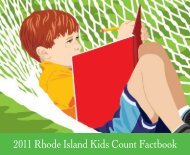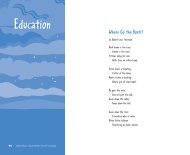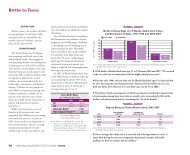2010 Rhode Island Kids Count Factbook
2010 Rhode Island Kids Count Factbook
2010 Rhode Island Kids Count Factbook
Create successful ePaper yourself
Turn your PDF publications into a flip-book with our unique Google optimized e-Paper software.
Full-Day Kindergarten<br />
100<br />
80<br />
DEFINITION<br />
Full-day kindergarten is the<br />
percentage of public school children<br />
enrolled in full-day kindergarten<br />
programs on October 1. Full-day<br />
kindergarten is defined as kindergarten<br />
programs that operate for at least six<br />
hours per day. Children enrolled in<br />
private kindergarten programs or in<br />
half-day kindergarten programs that<br />
offer after-school child care are not<br />
included.<br />
SIGNIFICANCE<br />
Children benefit academically from<br />
participating in full-day kindergarten.<br />
Those in full-day kindergarten are more<br />
likely to be ready for first grade than<br />
children in half-day kindergarten<br />
programs, regardless of family income,<br />
parental education and school<br />
characteristics. On average, the learning<br />
gains that students make in full-day<br />
kindergarten programs translate to a<br />
month of additional schooling over the<br />
course of a school year. Full-day<br />
kindergarten programs can be especially<br />
beneficial to poor and minority<br />
children and can contribute<br />
significantly to closing academic<br />
achievement gaps. 1,2,3<br />
With an estimated 80% of 4-yearolds<br />
in the U.S. enrolled in some type<br />
of preschool program, kindergarten no<br />
60<br />
Source: of and Secondary Education, October 1, 1, 2009.<br />
longer serves as the entry-point to<br />
40<br />
formal, full-day school for most young<br />
20 Children in Full-Day Public Kindergarten Programs,<br />
children. 4 Many parents favor full-day Core 0 Cities and <strong>Rhode</strong> <strong>Island</strong>, 1999-2000 and 2009-<strong>2010</strong> School Years<br />
kindergarten as it provides continuity<br />
1999-2000 2009-<strong>2010</strong><br />
for children who are already<br />
100%<br />
100% 99% 100% 100% 100% 100% 100%<br />
accustomed to full-day preschool<br />
92%<br />
80%<br />
experiences and it reduces the number<br />
60%<br />
68%<br />
of transitions and disruptions their<br />
60%<br />
40%<br />
child must make each day. 5 40%<br />
Also,<br />
20%<br />
teachers in full-day kindergarten<br />
18%<br />
18%<br />
0%<br />
0% 0%<br />
0%<br />
programs have more time to provide<br />
<strong>Rhode</strong> Core Central Newport Pawtucket Providence West meaningful learning opportunities that<br />
<strong>Island</strong> Cities Falls<br />
Warwick<br />
encourage cognitive, physical and<br />
<strong>Rhode</strong> <strong>Island</strong> Department Elementary 1999 and October<br />
before entering first grade. 10<br />
social-emotional development. 6,7<br />
◆ In <strong>Rhode</strong> <strong>Island</strong> in the 2009-<strong>2010</strong> school year, 60% of the children who attended<br />
Nationally, enrollment in full-day<br />
public kindergarten were in a full-day program. 11<br />
kindergarten has been increasing<br />
steadily over the past 25 years. In 1979,<br />
◆ During the 2009-<strong>2010</strong> school year, 16 school districts offered universal access to fullday<br />
kindergarten programs and another eight school districts operated at least one full-<br />
25% of kindergartners were in full-day<br />
programs. 8 In 2008, 72% of the<br />
day kindergarten classroom. All of the independent charter schools in <strong>Rhode</strong> <strong>Island</strong> that<br />
nation’s public school kindergarteners<br />
offer kindergarten run full-day programs. 12<br />
and 72% of private school<br />
kindergarteners were enrolled in fullday<br />
programs. 9<br />
Across the U.S., nine states require<br />
Academic Progress in Full-Day Kindergarten<br />
all school districts to offer full-day ◆ According to the National Center for Education Statistics, 68% of full-day kindergarten<br />
kindergarten and two states require classes spend more than one hour per day on reading instruction compared to 37% of<br />
children to attend full-day kindergarten half-day classes. 13<br />
◆ Full-day kindergarten classes are more likely than half-day classes to spend time every<br />
day on math (90% and 73%, respectively), social studies (30% and 18%, respectively),<br />
and science (24% and 10%, respectively). 14<br />
◆ Nationally, children in full-day kindergarten classes make greater academic gains in<br />
both reading and mathematics compared to those in half-day classes, even after adjusting<br />
for differences associated with race/ethnicity, poverty status, achievement level at<br />
kindergarten entry, gender and class size. 15<br />
124 <strong>2010</strong> <strong>Rhode</strong> <strong>Island</strong> KIDS COUNT <strong>Factbook</strong> / Education






